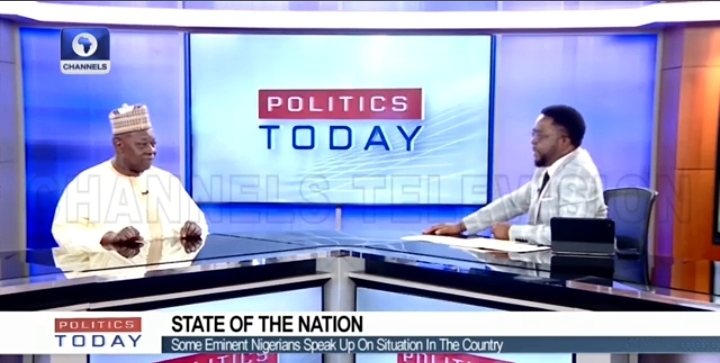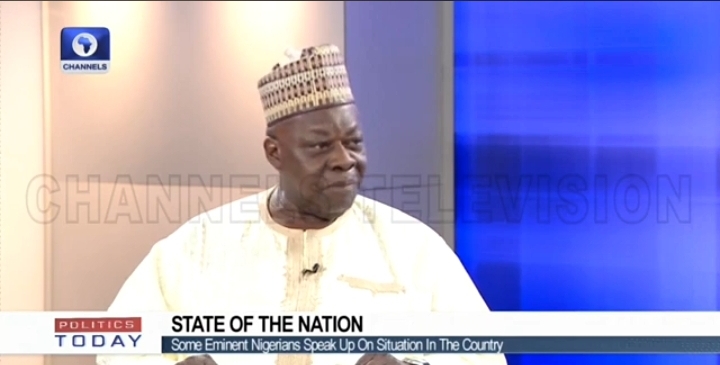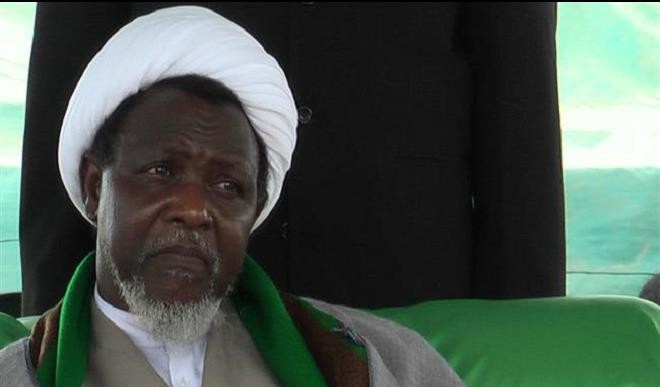What Tinubu govt is saying by criminalising, suppressing protesters is, ‘starve to death, silently, so nobody knows you are starving’ – Prof. Jubrin Ibrahim
*Tells why there is no forward movement in the country *“The corruption we have today is nowhere near what we had previously” *Jibrin says, ‘There is massive growth of insecurity because more and more Nigerians realize that this ruling class is not going to do anything for them’ *Prof Jibrin, Usman Bugaje, Clem Nwankwo, others summarise Tinubu’s last one year in office as “tragedy of doubled troubles with no show of empathy, prudence and competence in governance” *Nigerians are protesting because they don’t see relationship between what the government is saying and what is happening in their daily lives – Prof Jibrin

By KEMI KASUMU
Today, 25 years down the line, we looked back and we saw that the promise we made has not been realized because those who have been in successive governments since 1999 have not kept to the promise of using public resources to pursue public good; what they have done is to use public resources for their personal aggrandizement. The corruption that we have today is nowhere near what we had previously.
Some very elderly and eminent Nigerians, despite what looks like clamping down on any unfavourable public comments by the Bola Tinubu’s government, have done what looks like adopting the terminology used before and after the #EndSARS “Soro S’oke” (speak aloud) as they continue to come forward to say that they are concerned about the situation of unprecedented hardship and hunger in the country.


Among these people, who have done something using their intellectual property and capacity of writing papers as experts, professionals and elders statesmen in their own right, are Professor Abba AlKasum, Abubakar Sidiq Muhammed, Akilu Fatima, Dr. Usman Bugaje, Mr. Clement Nwankowo, Professor Jibril Ibrahim, Kole Shettima, Ene Obi, John Uda, Salihu Muhammed Kabir, Hon. Uche Onyeagocha and Mr. Y. Z. Yau.
All of them came together and put pen to paper on a particular piece titled, “Nigeria at a Cross Road”. In the work, which they jointly did, they said in the last 25 years that democracy returned to the country, governance and democracy have been threatened and that, now, they cannot only put forward the problems of this country but also come with solutions.
To discuss this piece, one of the co-authors, Professor Jibrin Ibrahim, a democracy and governance advocate and scholar, who is one of the elder statesman and eminent Nigeria who put forward the piece, “Nigeria at a Cross Road”, featured on Channels Television’s Politics Today Wednesday night and the discussion anchored by Seun Okinbaloye snowballed into him saying a government that cannot deliver dividends of democracy in one year three months should be expected as capable of doing anything in the rest of the four years remaining.
Asked if he had therefore written off Tinubu, while he did not give a straight answer, the explanation he gave was in the affirmative as he said if Tinubu’s government could be suppressing protesters who are complaining and crying about the hardship and unprecedented hunger and inability to afford medical treatment as they now face under his government due to his anti-people policies then, he said, it means the administration expects people to suffer and die in silence with their hardship and curable yet unaffordable-to-treat sickness.
The key things we point out is that policy is a set of actions that solves a problem. When you articulate policy and that problem remains unsolved and actually worsens, it means you are not implementing any policy. That means you are saying one thing and doing exactly the opposite and that is why there is no forward movement in the country.
Asked why he and his team putting forward the piece were coming out at this time and about how bad he thinks the situation in the country has become, Professor Jibrin Ibrahim said:
“We came out at this time because we are alarmed governance is collapsing completely in this country. We are alarmed because there is a complete breakdown of public trust between citizens and the government. And that we used the word ‘Cross Road’ to indicate that at this point it’s either government sits up and starts putting policies that work or the country itself would crumble. And that is why we feel that we need to review what has been happening over the past (25 years), get out of the present conjunction and look at the process in-depth with a focus of what can be done to address these issues so that we will begin to move the country forward. The risk at this time is extremely high and we need drastic action and that action has to be in terms of actually implementing policies.
“The key things we point out is that policy is a set of actions that solves a problem. When you articulate policy and that problem remains unsolved and actually worsens, it means you are not implementing any policy. That means you are saying one thing and doing exactly the opposite and that is why there is no forward movement in the country.”
In addition, because there is an abandonment of policy implementation on all sectors of the society, you have in the one hand the economic collapsing completely and the corollary to that is that has been the massive growth of insecurity as more and more Nigerians realize that this ruling class is not going to do anything for them.
Professor Ibrahim started off on reference to the last 25 years and not specifically talking about the Bola Tinubu’s government but talking about the promises that brought democracy back to the country and how the reason why military took power in this country and how the excuses are now almost there using the same script being that whenever the military came into power they say they want to fight corruption and correct the ills of corruption hat civilian has left.
What he and his co-writers described in the piece, according to the anchor, looks like backwardness. As one of those who were at the vanguard of when Nigeria crossed from military government to civilian government in 1999, Professor Jibrin Ibrahim was asked if he was disappointed at where the nation stands today considering the hopes and aspirations of the average Nigerian as at then when a young adult had thought that Nigerians were entering into a future that would bring a hope for them.
Responding he said, “Only 12 of us who wrote this piece were very participants in the struggle to end military rule; we were on the barricades, we engaged the process, we were consistent and we achieved results. The promise we made to Nigerians when we were fighting military rule was that when we have the returned to democracy, there is going to be a profound change in which public resources will be used for the public good.
In that case, what is happening is that the government of this country is telling stories that are not based on any reality and that is why citizens are exasperated (infuriated) because they don’t see a relationship what is said by government and what is happening in their daily lives.
“Today, 25 years down the line, we looked back and we saw that the promise we made has not been realized because those who have been in successive governments since 1999 have not kept to the promise of using public resources to pursue public good; what they have done is to use public resources for their personal aggrandizement. The corruption that we have today is nowhere near what we had previously.
“In addition, because there is an abandonment of policy implementation on all sectors of the society, you have the one hand the economic collapsing completely and the corollary to that is that has been the massive growth of insecurity as more and more Nigerians realize that this ruling class is not going to do anything for them and self-help becomes the new ideology.
“When we are told today that millions of Nigerian youths have procured arms, it is telling you something that this society has realized that the ruling class we have is extremely irresponsible and has not focused on the development of the society.”
Asked if he thinks that the political system in Nigeria has failed, the Professor replied in the affirmative saying, “It has failed to deliver,” and reminded that he described the current crop of political leaders as insensitive, he said, “Absolutely”.
Hearing the quote of one article from the piece by his group of writers that wrote “Nigeria at a Cross Road”: “The tragedy of the last one year is that we now have a regime that has not only doubled our troubles but has shown neither empathy, prudence nor competence in governance”, as summary of Bola Tinubu in the one year of his administration and thus asked whether that is also the position of the group, he said replied, “Absolutely because governments are judged by their acts of commission and by their act of omission.”
He continued, “Specific policies were put in place that have been extremely disastrous for the economy and for the people surviving within that economy. And those positive policies that were promised; the palliatives for example, Nigerians could never, ever seen those palliatives. We know we are told on a daily basis that billions and billions have been given to state governments and to Federal Ministries to address the problems of the poor, but those of us in contact with the poor have never met any poor Nigerian that has ever benefitted from what is being said.
“In that case, what is happening is that the government of this country is telling stories that are not based on any reality and that is why citizens are exasperated (infuriated) because they don’t see a relationship what is said by government and what is happening in their daily lives,” Professor Jibrin Ibrahim said.
The DEFENDER reports the professor in his own contributed article to the jointly written piece criticized major decisions of the Bola Tinubu administration and linked same with the problem of food inflation, food shortages, insecurity and corruption and, in fact, pointed out that the lifestyle of government officials are anything but underwhelming.
In the article he said, “The withdrawal of petroleum subsidy without any plan to cushion the effects has sent prices through the roof, the floating of the Naira and the IMF has sent the Naira crushing causing chaos in economy and poverty in the society. The rise in taxation and electricity bills has led to closure of many businesses and even private schools are finding it difficult to operate. The executive and the legislature including the judiciary appear to be in court to plunder the country to the finish.”
If you described the government of the day as such, he was told, it looks like there is no trust that he has given the Tinubu government and the government would tell him that what we have done is tandem with the yearning of a lot of Nigerian experts who have said: “This is the way to go, remove subsidy, float the Nigeria and crush the multiple exchange windows,” and this is what they say they have done. The government of the day would say, “Wait for us a moment, the policies and actions of our government will start yielding results. It’s a matter of time.
Impatience with Tinubu’s government?
Asked if not that he and his team are impatient with the government to start seeing the results, Professor Jibrin Ibrahim laughed and said, “Nigerians have a memory. Remember when they did this removal of fuel subsidy they said in weeks we would have NLG buses and the prices of transport would crash. That was 13 months ago that they said that and Nigerians know they haven’t seen those things. This idea is called ‘waiting for goodo’ in literate, when you are told that ‘the good things we have done you will see them soon and you go from weeks to months to years and you don’t see that good coming. Then you know that what you are being told is a narrative that is not based on any reality.
“And that is why Nigerians today are very upset and are very angry because they are being deceived regularly and systematically by a government that feels, “Oh, we can tell stories, we would survive, we would refuse to do what we need to do and we would survive because we would tell stories that would come our non-deeds and our bad deeds.” And at some point Nigerians have to say “No, you can’t continue to tell us stories.”
Tinubu written off
Asked if he had written Tinubu administration off in just over one year in office he said, “But you see if, in 14 months you are unable to show progress, then we don’t see how that progress will come in four years because progress has to start immediately because the crisis is serious and it has to be incremental.”
On whether the period is enough to start seeing the results he said, “Absolutely. If by now we haven’t started seeing results, it means those results are not on the way.”
On whether his group has written off this government thinking that nothing fruitful can come in the next four years he said, “No, no, no. We are telling this government that you can’t continue by giving false narratives. You have to actually start putting sets of policies in place that will address the issue.”
How partisanship makes palliatives fail
He said, “Let me explain something, for example that is very straightforward to you. There is this story that we have been giving billions and billions of naira to state governments to use for palliatives and to address the food problems in their states. And it’s true these monies are given to the state governments. What happened to these monies? That is the question you have to answer. Everybody in this country knows what happened. It goes to the governor, the governor takes it and then distributes it to local governments, the local government gives it to wards.
But who does it get to at the Federal, state, local government and ward levels? It goes to the party’s barons who are in power and they, therefore, cornered all these resources that are coming in and refuse to distribute it to those who are actually in need. And everybody knows that this money, these resources, these grains that are distributed never get to those in need but go to those who are already enjoying vast salaries, vast allowances and then they take these palliatives and add to their wealth and accumulation.
“So, that is the story. Since no government in this country can pretend it doesn’t know what is happening, you can’t continue doing the same thing and expect you will get a different result. That is the point we are saying. So, the policy of government in terms of these palliatives is to make sure the poor never get it.”
The way to go
“What we are saying is that everybody knows where the poor are in this country and everybody can identify them. Why is it that you only distribute to politically exposed individuals knowing fully well that those politically exposed individuals who feel they are entitled to gather all the resources of the country to their own families’ needs and aggrandizement, by so doing you are making sure that you deepen the gulf between the ordinary people who are in real trouble and the political class that has completely lost touch with the reality of what is happening in their own society.
“What we are saying is this: The social distance between government and people in this country has become extremely wide and there is a certain callousness, wickedness of people in government who don’t appear to be worried at all about the hunger in the land. I mean, one of the issues people encounter is that when they fall sick and they see medical personnel they are given prescription, they can’t buy the drugs. And every day people are dying in this country because they are sick; their sickness is curable but they don’t have the money to buy the drugs.
“People are beginning to starve in this country and what does government say? “Oh, some political enemies are mobilizing them to agitate.” So, what government is saying (is that), “People are starving, they should starve quietly and not make noise so that nobody will hear that they are starving till they die.” People are now saying, “No! For heaven’s sake, we are not going to starve to death, silently, we are going to scream, we are going to make a point that we voted for government to address our problems and they are not addressing that problems and they are letting us waste in this society.””









